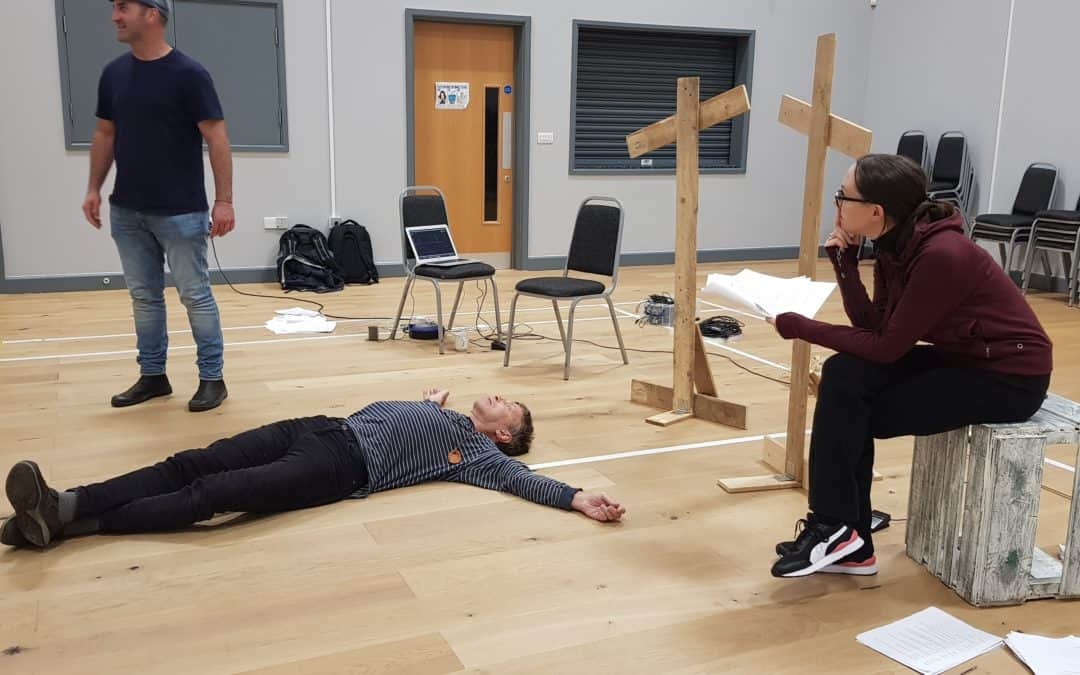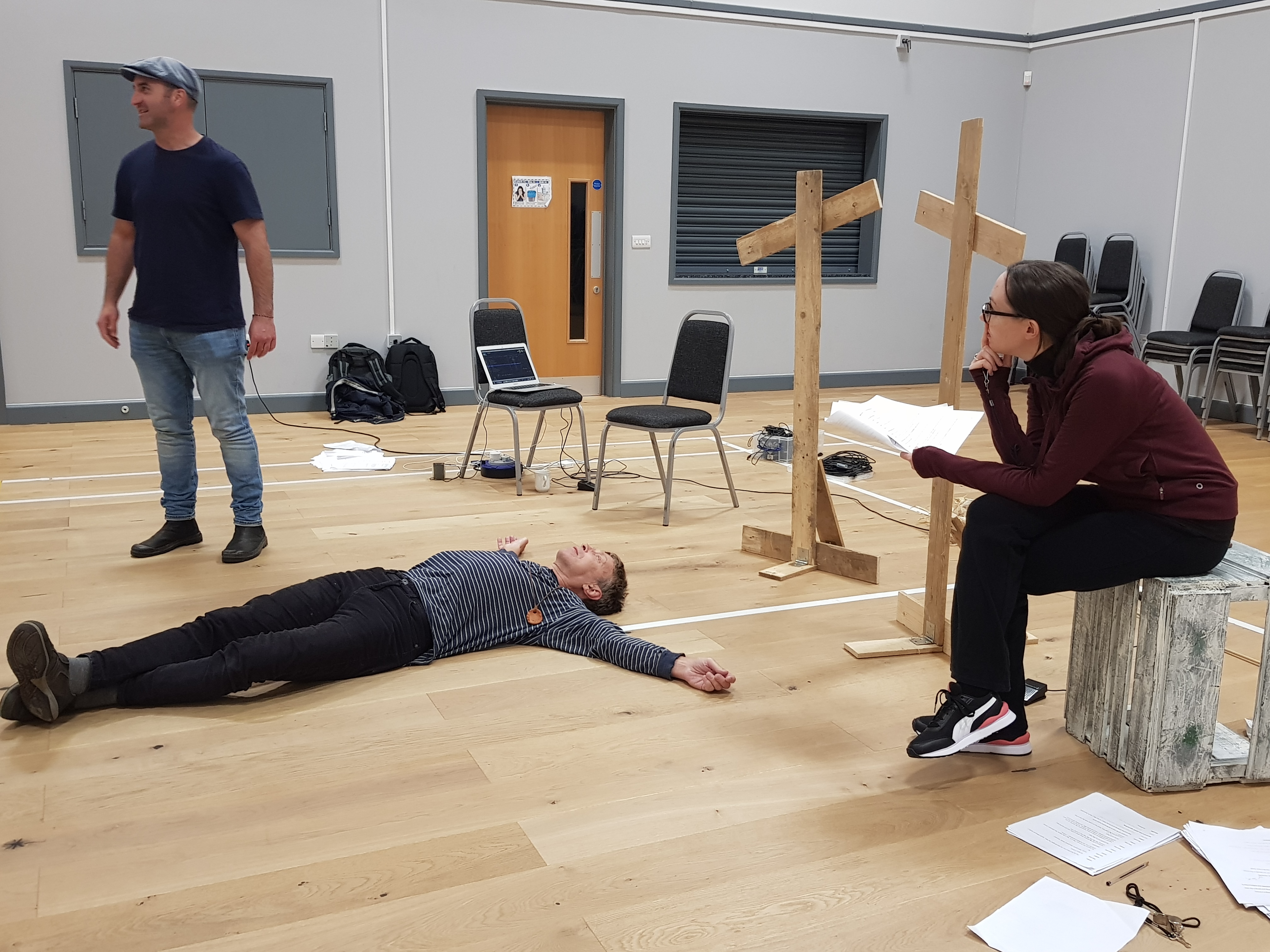Last night I was back in a room with performers, joining a rehearsal for live theatre for the first time in 20 months. This was obviously a joyous moment – but it was also back to work, experiencing and questioning how a previously-produced script was going to work for a totally new audience.
My play Hefted, which existed as a mixed professional-community production in 2018 and a digital audio piece in 2019, is now being rehearsed for its second run-out as a studio touring piece – only this time, it’s moving outside the South West and into a small national rural tour through 2021/22.
In the words of Bill Buffery – co-artistic director of theatre company Multi Story with Gill Nathanson, which has been funded by Arts Council England to produce the tour – the pandemic has been a shared experience nationally and globally that’s not only increased our awareness of the things that divide us (masked/unmasked, vax/anti-vax, protest/abstain, take action/give up, individual freedom/common interest) but has also given us an enforced moment of pause and taking stock: an opportunity to connect with the things that are most important to us.
I touched on this in a more environmentally-angled blog last year too, when Hefted had a second audio outing during the first lockdown.
The point we were discussing last night however, was that whilst the roots of this particular play are deeply entwined with the landscapes, culture, history and people of North Devon, this context in which audiences were going to now receive it – one where we are, every day, more acutely aware than ever of a global experience which is shaping our individual and local day-to-day lives – was a context shared the nation over. It is immediate and new.
We are all carrying a pandemic experience with us, whether we like it or not – and the lens through which we therefore experience things – especially stories – has universally shifted.
In Multi Story’s innovative, theatrical, multi-roling and haunting interpretation, Hefted’s cycle of myths and tales is being revisited by an island community in the future, looking back at 600 years of humankind’s relationship to the land and asking how they came to be on the precipice of extinction.
At the point of a community’s most extreme crisis, the stories passed down through their generations are what they reach for to explain themselves to one another.
Audiences don’t need to be told that we’re living in a moment of global political upheaval; that we’re on an environmental precipice as the anthropocene lurches to a point of no return; that communities are becoming more polarised and divided than ever, and a sense of unity and common purpose has never seemed further away.
They don’t need a production to do that work for them. That story is already in the room.
So, in terms of the script, the stories simply feel subtly different now to the way they did in 2019. They hit the air with a different vibration. New resonances offer themselves up, new associations ring true, a new sense of urgency and pressure seems to galvanise our exploration of what can be unearthed from the characters and their stories, what can connect and prove meaningful to an audience today.
It’s fascinating watching the scenes getting unpicked, the layers of the onion getting peeled back to find what might be underneath.
Tonight, we work on one scene that is told through seven different sections of a train journey – a journey that would, in reality, take around 50 minutes – but which we rattle through in nearer 8 or 9, deliberately jolting through the shifts and changes in a relationship between two brothers, as a guard’s whistle marks transitions and time shifts. There’s a physical and emotional arc to the scene and we’re trying to hit the shape of it in the most effective way.
We’re not talking ‘about’ covid or the pandemic directly as we rehearse. Not at all.
But it does feel like we’re reaching deeper into these characters’ situations than before and, in doing so, considering some of those binaries above – especially around which of us choose to stay put and take action when the world is spinning out of control, and which of us choose to run away and/or make rash and judgemental choices.
In a more complex way, we’re also exploring what happens when actually both of those pathways feels like the most righteous and just way forward for those pursuing them, and what happens when that’s occurring within a single family (or community) that has until that moment assumed shared politics and values.
When our futures hang in the balance, and we feel our way is the only way that can possibly make sense, our deeper truths can reveal themselves to others – and to ourselves – in stark and alarming ways.
Pre-covid, I’d always leant towards selling Hefted to myself and others ultimately as a story cycle of hope, renewal, self-realisation and redemption, exploring humankind’s tempestuous relationship with the environment but in a way that does offer togetherness, lightness and a moment of community.
Tonight it felt most strongly like it was about what choices people make in extreme situations when it feels like a matter of life and death: and whether they are choosing for themselves or their community.
That’s not to underplay the severity of the pandemic’s ongoing impact of course – many thousands of people have actually died as a result – but as a national and global audience we have never collectively lived through a situation like this. What’s important – from a dramatic perspective, what’s at stake in our lives – becomes amplified. Things that beforehand may have felt minor take on a greater magnitude of meaning.
We are making theatre for an adjusted world, and the audience is bringing that world into the space with them. When your script crosses that space, between the stage and them, what is it you want them to connect with?

